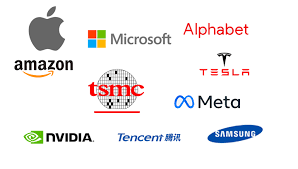The Impact of All Technology on Society
Technology has become an integral part of our daily lives, shaping the way we communicate, work, and live. From smartphones to artificial intelligence, all technology plays a significant role in driving innovation and progress across various industries.
One of the key impacts of all technology is the way it has revolutionised communication. With the advent of social media platforms and instant messaging apps, people can now connect with others from different parts of the world in real time. This has not only made communication more convenient but has also facilitated the sharing of ideas and information on a global scale.
Furthermore, technology has transformed the way we work. Automation and digital tools have streamlined processes, increased efficiency, and opened up new opportunities for remote work. Businesses are now able to operate more effectively and reach a wider audience thanks to advancements in technology.
In addition to communication and work, all technology has had a profound impact on healthcare. Medical devices, telemedicine services, and health monitoring apps have improved patient care, diagnosis accuracy, and treatment outcomes. The integration of technology in healthcare has made medical services more accessible and efficient.
However, with all these benefits come challenges as well. Concerns about data privacy, cybersecurity threats, and job displacement due to automation are some of the issues that society faces as a result of rapid technological advancements. It is crucial for policymakers, businesses, and individuals to address these challenges proactively to ensure that technology benefits society as a whole.
In conclusion, all technology has transformed how we communicate, work, and access healthcare services. While it brings numerous benefits and opportunities for progress, it also presents challenges that need to be managed effectively. By embracing innovation responsibly and leveraging technology for positive change, we can harness its full potential to create a better future for society.
Seven Advantages of Technology: Transforming Communication, Efficiency, and Innovation
- Enhances communication and connectivity on a global scale
- Increases efficiency and productivity in various industries
- Facilitates remote work opportunities and flexible schedules
- Improves access to information and educational resources
- Advances healthcare services through innovative medical technologies
- Enables automation of repetitive tasks, saving time and effort
- Drives innovation and fosters creativity in problem-solving
The Dark Side of Technology: Navigating Privacy, Security, Employment, Access, Social, and Environmental Challenges
- Privacy concerns related to data collection and surveillance
- Cybersecurity threats and risks of hacking attacks
- Job displacement due to automation and AI replacing human workers
- Digital divide widening the gap between those with access to technology and those without
- Dependency on technology leading to reduced face-to-face interactions and social skills
- Environmental impact of electronic waste generated by rapid technological advancements
Enhances communication and connectivity on a global scale
The advancement of technology has significantly enhanced communication and connectivity on a global scale. Through the use of smartphones, social media platforms, and instant messaging apps, individuals can now easily connect with others from different corners of the world in real time. This increased connectivity has not only made communication more convenient but has also fostered the sharing of ideas, cultures, and information across borders. As a result, technology has played a vital role in breaking down barriers and bringing people closer together, creating a more interconnected and inclusive global community.
Increases efficiency and productivity in various industries
The advancement of technology has significantly enhanced efficiency and productivity across a multitude of industries. Automation, digital tools, and streamlined processes have revolutionised the way businesses operate, allowing them to accomplish tasks faster and more effectively. By leveraging technology, organisations can optimise their workflows, reduce manual errors, and allocate resources more efficiently. This increase in efficiency not only boosts productivity but also contributes to overall growth and competitiveness in the rapidly evolving global marketplace.
Facilitates remote work opportunities and flexible schedules
One significant advantage of all technology is its ability to facilitate remote work opportunities and enable flexible schedules for employees. With the rise of digital tools and communication platforms, individuals can now work from anywhere in the world, breaking free from traditional office constraints. This flexibility not only enhances work-life balance but also allows companies to tap into a global talent pool, fostering diversity and innovation in the workforce. By embracing remote work options made possible by technology, organisations can boost productivity, employee satisfaction, and overall efficiency in today’s dynamic and interconnected world.
Improves access to information and educational resources
One significant advantage of all technology is its ability to enhance access to information and educational resources. Through the internet, online databases, and digital learning platforms, individuals across the globe can now easily obtain a wealth of knowledge on diverse subjects. This increased accessibility to educational resources empowers people to learn new skills, pursue academic interests, and stay informed about current affairs, ultimately contributing to personal growth and societal development.
Advances healthcare services through innovative medical technologies
Advances in healthcare services through innovative medical technologies represent a significant pro of all technology. These advancements have revolutionised the field of medicine, leading to improved patient care, more accurate diagnoses, and enhanced treatment options. From state-of-the-art medical devices to telemedicine platforms, technology has enabled healthcare professionals to deliver better and more efficient services to patients. By harnessing the power of innovation in medical technologies, the healthcare industry can address complex health challenges, enhance medical outcomes, and ultimately improve the quality of life for individuals around the world.
Enables automation of repetitive tasks, saving time and effort
One significant advantage of all technology is its ability to enable the automation of repetitive tasks, resulting in time and effort savings. By automating mundane and routine processes, individuals and businesses can focus on more strategic and creative endeavours. This not only increases productivity but also allows for a more efficient allocation of resources, ultimately leading to improved outcomes and innovation. The automation of repetitive tasks through technology streamlines operations, reduces human error, and enhances overall workflow efficiency, contributing to increased effectiveness in various aspects of work and daily life.
Drives innovation and fosters creativity in problem-solving
One significant pro of all technology is its ability to drive innovation and foster creativity in problem-solving. By providing tools, resources, and platforms for individuals and businesses to explore new ideas and approaches, technology encourages a culture of continuous improvement and ingenuity. Whether through the development of cutting-edge software solutions, the design of revolutionary products, or the implementation of efficient processes, technology empowers innovators to tackle complex problems in creative ways, ultimately leading to advancements that benefit society as a whole.
Privacy concerns related to data collection and surveillance
Privacy concerns related to data collection and surveillance are a significant con of all technology. With the increasing amount of personal information being collected and shared online, individuals are at risk of having their privacy compromised. From targeted advertising to potential data breaches, the constant monitoring and tracking of user activities raise valid concerns about how this data is being used and who has access to it. As technology continues to advance, it is essential for regulations and safeguards to be put in place to protect individuals’ privacy rights in the digital age.
Cybersecurity threats and risks of hacking attacks
Cybersecurity threats and the risks of hacking attacks pose a significant con of all technology. With the increasing interconnectedness of devices and systems, individuals and organisations are vulnerable to cyberattacks that can compromise sensitive data, disrupt operations, and lead to financial losses. Hackers exploit vulnerabilities in software and networks to gain unauthorised access, steal information, or launch malicious activities. The constant evolution of cyber threats requires robust security measures, regular updates, and user vigilance to mitigate the risks associated with cybersecurity breaches. It is essential for individuals and businesses to prioritise cybersecurity practices to safeguard their digital assets and maintain trust in an increasingly technology-driven world.
Job displacement due to automation and AI replacing human workers
One significant con of all technology is the potential job displacement caused by automation and artificial intelligence replacing human workers. As machines become more advanced and capable of performing tasks traditionally done by humans, there is a growing concern about the impact on employment opportunities. The fear of mass unemployment looms large as certain jobs become obsolete, leading to economic uncertainty and social disruption. It is essential for society to address this challenge by retraining workers for new roles, fostering innovation in emerging industries, and implementing policies that support a smooth transition towards a workforce that can coexist harmoniously with technology.
Digital divide widening the gap between those with access to technology and those without
The widening digital divide exacerbates the disparity between individuals who have access to technology and those who do not, creating a significant con of all-encompassing technology. This gap not only limits the opportunities for those lacking access to digital resources but also hinders their ability to participate fully in the digital age. As technology continues to advance rapidly, addressing this divide is crucial to ensure that everyone has equal access to information, education, and opportunities for socio-economic advancement. Efforts must be made to bridge this gap and provide equitable access to technology for all members of society.
Dependency on technology leading to reduced face-to-face interactions and social skills
One significant con of all-encompassing technology is the growing dependency on digital devices, which often results in diminished face-to-face interactions and weakened social skills. As individuals increasingly rely on screens for communication and entertainment, the art of meaningful in-person conversations and interpersonal connections may be fading. This trend can lead to a decrease in empathy, effective communication abilities, and the development of essential social skills crucial for building strong relationships and navigating real-world interactions. It is essential to strike a balance between utilising technology for its benefits while also prioritising genuine human connections to maintain healthy social dynamics and interpersonal relationships.
Environmental impact of electronic waste generated by rapid technological advancements
The rapid technological advancements that drive the constant cycle of upgrading electronic devices have led to a significant con: the environmental impact of electronic waste. As newer, more advanced gadgets are introduced into the market, older devices quickly become obsolete and are discarded, contributing to a growing e-waste problem. Improper disposal of electronic waste can result in harmful chemicals leaching into the environment, posing risks to ecosystems and human health. Addressing this challenge requires sustainable practices such as recycling, refurbishing, and proper disposal of electronic devices to minimise the environmental footprint of our technological consumption.



